In the Company of Sara Beckton-León
/ En Compañía de Sara Beckton-León
Sara Beckton-León, the creator of The Parlor Room sits with us to be part of the In the Company of blog series. She tells us what her favorite thing about Bell Arts Factory is, what success means to her, what her biggest overall lesson has been in running a business, she even told us an inspirational story about Marilyn Monroe and more.
Sara Beckton-León, la creadora de The Parlor Room se sienta con nosotros para ser parte de la serie de En Compañía de blogs. Nos cuenta qué es lo que más le gusta de Bell Arts Factory, qué significa el éxito para ella, cuál ha sido su mayor lección general en la gestión de un negocio, incluso nos contó una historia inspiradora sobre Marilyn Monroe y más.
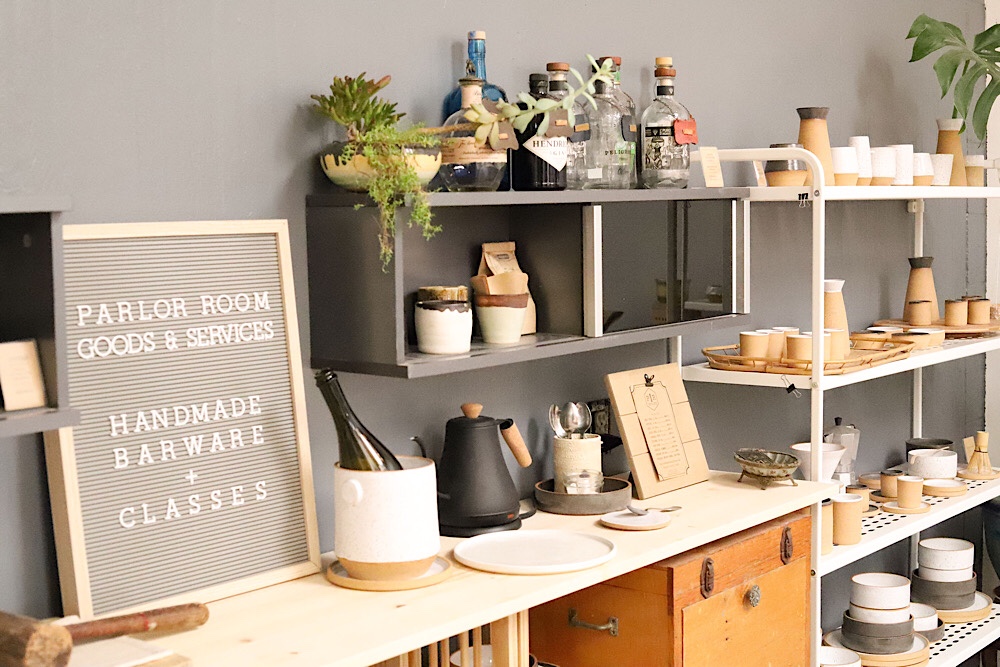
The Parlor Room was created by long-time artist and bartender Sara Beckton-Leon as a place to manifest her creative exploits and passion for hospitality. The Parlor Room is where art meets bar, where creativity meets hospitality. In the Parlor Room: Bell Arts Factory’s Studio #96, she creates hand-made bar ware designed to bring people together, foster slow living, and savor the stuff of life. The Parlor Room also creates opportunities to explore creativity and personal expression through lessons in ceramics. The Parlor Room celebrates enthusiastic living and encourages the savoring of life.
The Parlor Room fue creado por la artista y bartender Sara Beckton-Leon como un lugar para manifestar sus hazañas creativas y su pasión por la hospitalidad. The Parlor Room es donde el arte se encuentra con el bar, donde la creatividad se encuentra con la hospitalidad. En Parlor Room: Bell Arts Factory’s Studio # 96, ella crea artículos de bar hechos a mano diseñados para unir a las personas, fomentar la vida lenta y saborear las cosas de la vida. El Parlor Room también crea oportunidades para explorar la creatividad y la expresión personal a través de lecciones de cerámica. El Parlor Room celebra la vida entusiasta y anima a saborear la vida.
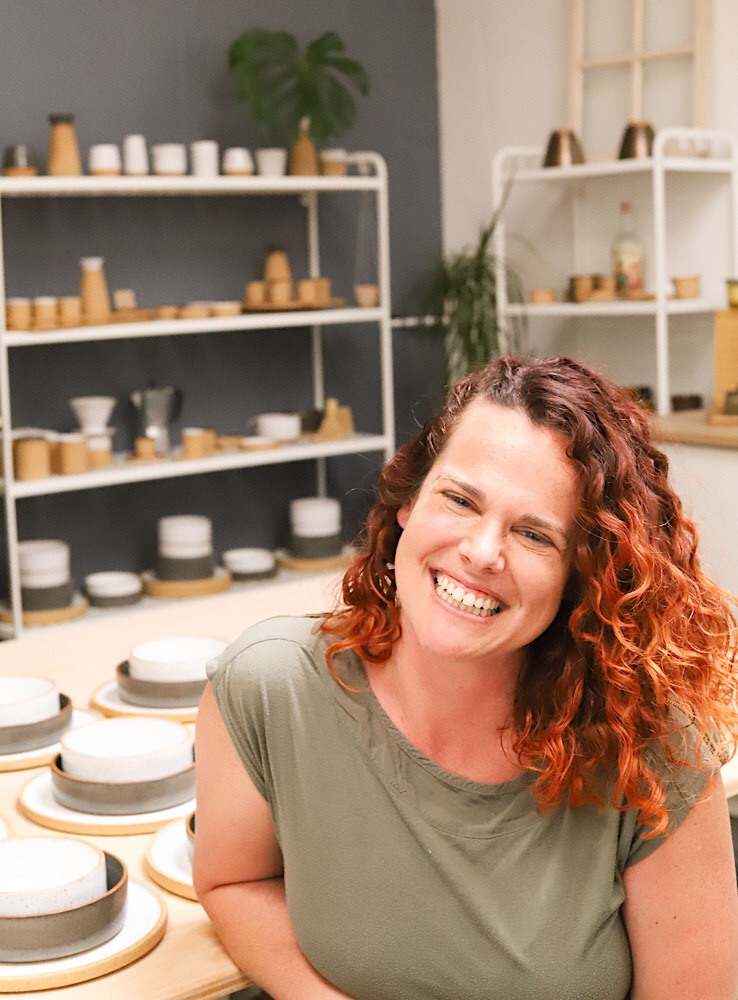
We recently had the opportunity to ask Sara some questions and this is what he answered us:
What did you want to be when you were a child?
When I was a child I wanted to be… I would call it a renaissance man. I kinda wanted to just learn to make anything, build anything. I was always involved with my dad’s projects. I remember covering our dining room chairs and building a table and… He is actually a really good seamstress. He is really the one who taught me how to sew. Back in the 70’s he would make his own bell bottoms and insert his own fabric and stuff. All of his sisters would do that, so he learned to do it himself. He didn’t really make clothes, mostly because my mom would not let him wear any of it. He was just really good at doing things the right way and I realized I didn’t have much patience. I always wanted to cut corners but I wanted something to look nice. I learned from being involved in his projects and I realized I like making things.
What is your favorite thing about your workspace or your studio at Bell Arts Factory?
I have been in so many spaces within Bell Arts Factory. I started over at Studio #77, then I moved into Maribel Hernández’s Studio #97. In Maribel’s Studio I started in with a little wall, then I moved into a corner. Then I moved into my own studio here #84 and now I am moving into Studio #96. My favorite thing about Bell Arts Factory is that being in this space opens your mind to possibilities. I started out and I didn’t think that I was going to have a ceramics company. I moved here without any art materials or anything. I just started using scraps, whatever got donated or whatever came my way. I knew how to do ceramics, I just didn’t have any clay, or a wheel… I didn’t have any of the materials and I was playing around with glass. I think the important part was just being in this space and tinkering and not really having an agenda. A lot of people don’t get started, I find, because they don’t know where they are going yet, and that’s really not how things happen in real life. One has to be okay with not knowing where one is going to go and not necessarily needing it to be a certain way. I believe creativity and making money don’t really have anything to do with each other and if you are expecting or forcing a relationship there, then I find the creativity part goes away. So having this develop super organically, this little ceramic business, honestly really just came from becoming friends with Maribel. It’s just about having those connections. Maribel told me “You need to come and just share my studio” and just being around her made me want to be in this space more. At that time we were sharing the studio with other artists, but it felt like it was just me and her there all the time. The wheel that I started on was actually her friend’s wheel. Maribel offered it for me to use and I started making things for my own home bar, because I am also a bartender and that’s another passion of mine. Then other people started wanting those things too and that really slowly and organically started growing into a business. None of that happened with me coming in here saying to myself “I’m going to have a ceramics business.” I just came in and started tinkering and one thing led to the next. It’s really amazing! I thank my stars!
What is your favorite thing about your workspace or your studio at Bell Arts Factory?
I have been in so many spaces within Bell Arts Factory. I started over at Studio #77, then I moved into Maribel Hernández’s Studio #97. In Maribel’s Studio I started in with a little wall, then I moved into a corner. Then I moved into my own studio here #84 and now I am moving into Studio #96. My favorite thing about Bell Arts Factory is that being in this space opens your mind to possibilities. I started out and I didn’t think that I was going to have a ceramics company. I moved here without any art materials or anything. I just started using scraps, whatever got donated or whatever came my way. I knew how to do ceramics, I just didn’t have any clay, or a wheel… I didn’t have any of the materials and I was playing around with glass. I think the important part was just being in this space and tinkering and not really having an agenda. A lot of people don’t get started, I find, because they don’t know where they are going yet, and that’s really not how things happen in real life. One has to be okay with not knowing where one is going to go and not necessarily needing it to be a certain way. I believe creativity and making money don’t really have anything to do with each other and if you are expecting or forcing a relationship there, then I find the creativity part goes away. So having this develop super organically, this little ceramic business, honestly really just came from becoming friends with Maribel. It’s just about having those connections. Maribel told me “You need to come and just share my studio” and just being around her made me want to be in this space more. At that time we were sharing the studio with other artists, but it felt like it was just me and her there all the time. The wheel that I started on was actually her friend’s wheel. Maribel offered it for me to use and I started making things for my own home bar, because I am also a bartender and that’s another passion of mine. Then other people started wanting those things too and that really slowly and organically started growing into a business. None of that happened with me coming in here saying to myself “I’m going to have a ceramics business.” I just came in and started tinkering and one thing led to the next. It’s really amazing! I thank my stars!
Tuvimos la oportunidad recientemente de hacerles algunas preguntas a Sara y esto fue lo que nos contestó:
¿Qué querías ser cuando niña?
Cuando niña quería ser… quizás lo llamaría algo así como un hombre renacentista. Quería aprender a hacer cualquier cosa, construir cualquier cosa. Siempre estuve involucrado en los proyectos de mi papá. Recuerdo cubrir las sillas de nuestro comedor y construir una mesa y… en realidad es un costurero muy bueno. Él es realmente quien me enseñó a coser. En los años 70, hacía sus propios pantalones acampanados e insertaba sus propias telas y cosas así. Todas sus hermanas hacían lo mismo, así que aprendió a hacerlo por igual. En realidad, no cosía su propia ropa, sobre todo porque mi madre no le dejaba. Él era realmente muy bueno haciendo las cosas de una manera correcta y fue así que me di cuenta de que yo no tenía mucha paciencia. Siempre quise hacerlo todo rápido, pero también quería que todo estuviera bien hecho. Aprendí a estar involucrada en sus proyectos y me di cuenta de que me gusta hacer cosas.
¿Qué es lo que más te gusta de tu espacio de trabajo o de tu estudio en Bell Arts Factory?
He estado en muchos espacios dentro de Bell Arts Factory. Empecé en el Estudio #77, luego me mudé al Estudio #97 de Maribel Hernández. En el estudio de Maribel comencé con una pequeña pared, luego me mudé a una esquina. Luego me mudé a mi propio estudio aquí #84 y ahora me mudaré al Studio #96. Lo que más me gusta de Bell Arts Factory es que estar en este espacio abre tu mente a muchas posibilidades. Empecé y no pensé que iba a tener una empresa de cerámica. Me mudé aquí sin ningún tipo de material de arte, ni nada. Empecé a usar desechos, lo que fuera donado o lo que se me cruzara. Sabía hacer cerámica, simplemente no tenía arcilla, ni una rueda… No tenía nada de materiales y estaba experimentando un poco con vidrio. Creo que lo importante fue simplemente estar en este espacio, seguir retocando y no tener realmente una agenda. Muchas personas no comienzan, creo, porque todavía no saben a dónde van, y realmente no es así como suceden las cosas en la vida real. Uno tiene que estar de acuerdo con no saber adónde va a ir y no necesitar necesariamente que sea de una cierta manera. Creo que la creatividad y ganar dinero realmente no tienen nada que ver entre sí y si estás esperando o forzando una relación allí, entonces encuentro que la parte de la creatividad desaparece. Entonces, el hecho de que esto se desarrolle de manera súper orgánica, este pequeño negocio de la cerámica, honestamente en realidad solo vino de la amistad con Maribel. Se trata solo de tener esas conexiones. Maribel me dijo “Tienes que venir y compartir mi estudio” y el solo hecho de estar cerca de ella me hizo querer estar más en este espacio. En ese momento compartimos el estudio con otros artistas, pero la mayoría del tiempo estábamos solo ella y yo. La rueda con la que empecé era de una de sus amigas. Maribel me lo ofreció para que la usara y comencé a hacer cosas para mi propio bar, porque también soy bartender y esa es otra de mis pasiones. Luego, otras personas comenzaron a querer esas cositas y así comenzó a crecer de manera muy lenta y orgánica hasta convertirse en un negocio. Nada de eso solo sucedió viniendo aquí y diciéndome: “Voy a tener un negocio de cerámica”. Simplemente entré, retoqué y una cosa llevó a la otra. ¡Es realmente increíble! ¡Le doy gracias a mis estrellas!
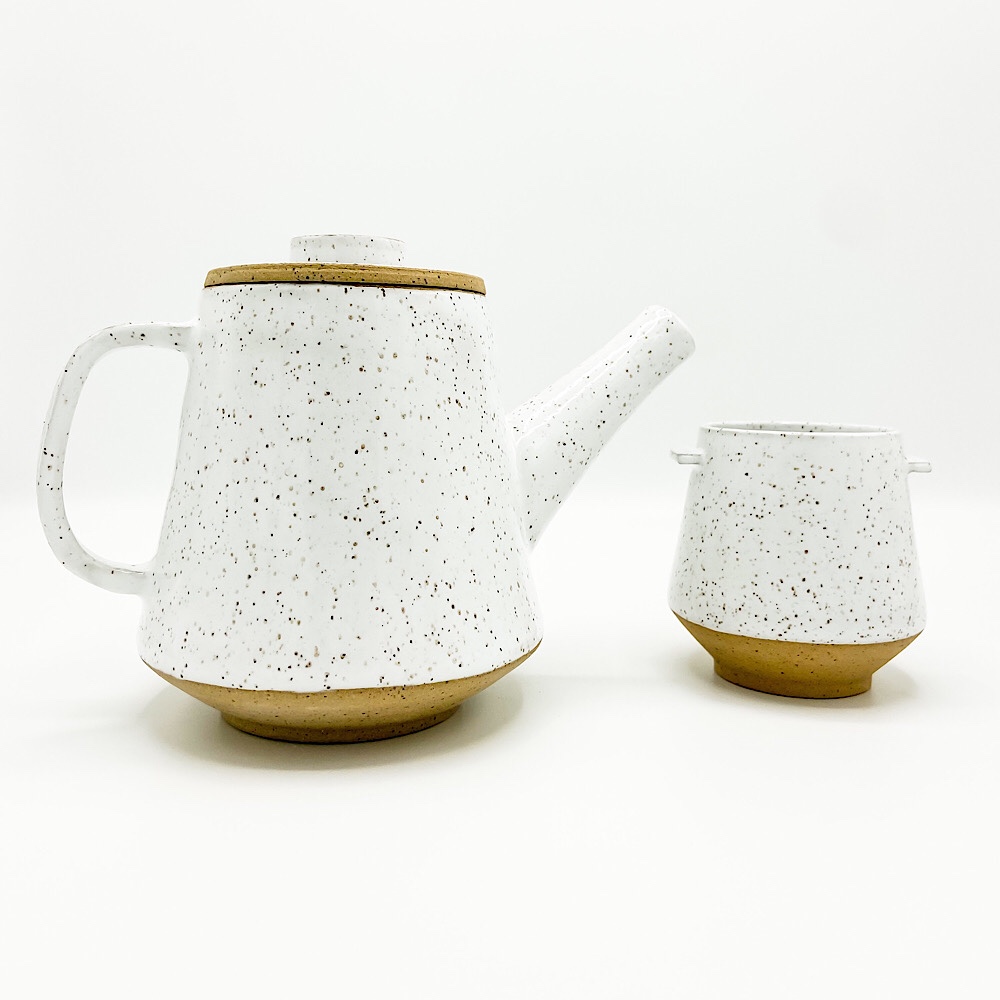
What does success mean to you?
Wow! Being able to show up consistently. Being able to still feel driven. Reading the notes in my shop when somebody buys something as a gift, those sorts of things are little reminders of why I show up. I love design, a lot. As a bartender I am so aware of hospitality, in the sense of when I make something I am thinking about how someone is going to use it and how it may affect somebody’s life. I know a lot of other ceramicists who just like making things for themselves, and that is important. I am constantly thinking about how this thing that I am creating is going to get used by someone else. I also think about how design affects culture and social practices. Little sake cups for example, sake is something that is meant to be social… you don’t refill your own glass. That would be the height of rudeness. Rudeness from your friends not paying attention to your needs, because your glass is small you have to constantly pay attention. You are aware of what other people need and it’s your job to fill their glass and keep them full and because it is a small glass it means you are returning often. Same with a big punch bowl and small punch cups. The punch bowl becomes a place that people keep gathering at, keep coming back to. I think that design has a cool and neat implication on how we interact as people.
If you were given 100 million dollars would you run your business any differently?
I would probably like to hire at least another person. I think small is good. I don’t really like the idea of getting away from the design part of it. When one passes off too many tasks, I think there is something that may get lost. I think I can really improve in a lot of areas like marketing, social media and stuff like that. I would love to pass stuff like that on or find somebody who’s good at those things. I think I would also just like to take somebody through my process. I am a very methodical person so almost everything that I do has a reason behind it. The same as when I train people to bartend: how to clean, how to make a cocktail. It is different when you are making one cocktail, versus two cocktails. Nothing is thoughtless. Also, when you have somebody else around, you are just able to zoom out a little bit, they ask questions and that makes you think about things differently… being an artist is pretty solitary… being able to bring other people into this world, could probably only make me better.
Sometimes we just want to share what we know with others…
I think it is so important. There is the idea that everybody else has it together. Everybody thinks I have it together and I’m like “What are you talking about?” I am just figuring this out. I feel like I am drowning under a billion things to do all the time and people say to me “Oh my God, you did it!” and I answer “Did what?”. I want to tell them “You just have to start swimming. Just move!”. I went to art school 15 years ago and it took me going to some other school, bartending and doing all of these other things that weren’t art related, to bring me back here. I’m not only an artist and I think that is why… I’ve had 35 jobs, you know… hustling… and everything has something to teach you. When you get to a certain point, you can look back and start to put some of those valuable things together.
¿Qué significa el éxito para ti?
¡Wow! Ser capaz de mantenerse constante. Poder seguir sintiéndose impulsado. Al leer las notas en mi tienda cuando alguien compra algo como regalo, ese tipo de cosas son pequeños recordatorios del por qué hago lo que hago. Amo el diseño. Como bartender, soy muy consciente de la hospitalidad, en el sentido de que cuando hago algo, pienso en cómo alguien lo va a usar y cómo puede afectar la vida de alguien. Conozco a muchos otros ceramistas a los que les gusta hacer cosas por sí mismos, y eso es importante. Pienso constantemente en cómo esta cosa que estoy creando va a ser utilizada por otra persona. También pienso en cómo el diseño afecta la cultura y las prácticas sociales. Vasitos de sake, por ejemplo, el sake es algo que está destinado a ser social… no llenas tu propio vaso. Eso sería el colmo de la mala educación. Descortesía a tus amigos al no prestar atención a sus necesidades, porque si tu vaso es pequeño tienes que estar constantemente atento. Usted es consciente de lo que necesitan otras personas y es tu trabajo llenar sus vasos y mantenerlos llenos y, como es un vaso pequeño, significa que uno regresa con frecuencia. Lo mismo ocurre con una ponchera grande y tazas pequeñas para ponche. El tazón de ponche se convierte en un lugar al que la gente sigue reuniéndose, siguen volviendo. Creo que el diseño tiene una implicación genial y clara en cómo interactuamos como personas.
Si te dieran 100 millones de dólares, ¿Manejarías tu negocio de manera diferente?
Probablemente me gustaría contratar al menos a otra persona. Creo en algo pequeño. Realmente no me gusta la idea de alejarme de la parte del diseño. Cuando uno delega demasiadas tareas, creo que hay algo que se puede perder. Creo que realmente puedo mejorar en muchas áreas como marketing, redes sociales y cosas por ese estilo. Me encantaría delegar cosas así o encontrar a alguien que sea bueno en esas cosas. Creo que también me gustaría enseñarle a alguien a través de mi proceso. Soy una persona muy metódica por lo que casi todo lo que hago tiene una razón detrás. Lo mismo que cuando entreno a la gente a hacer bar: cómo limpiar, cómo hacer un cóctel. Es diferente cuando se prepara un cóctel en lugar de dos cócteles. Nada es poco considerado. Además, cuando tienes a alguien a tu alrededor, puedes alejarte un poco, te hacen preguntas y eso te hace pensar en las cosas de diferente manera… ser un artista es bastante solitario… introducir a otras personas a este mundo, podría probablemente solo hacerme mejor.
A veces solo queremos compartir lo que sabemos con los demás…
Creo que es muy importante. Existe la idea de que todos los demás lo tienen todo establecido. Todo el mundo piensa que lo tengo descifrado… “¿De qué estás hablando?” Solo estoy descubriendo todo. Siento que me ahogo bajo las mil millones de cosas que hago y la gente me dice “¡Dios mío, lo hiciste!” y yo respondo “¿Hiciste qué?”. Me gustaría decirles “Solo tienes que empezar a nadar. ¡Sólo muévete!”. Fui a la escuela de arte hace 15 años y me llevó ir a otra escuela, ser cantinera y hacer todas estas otras cosas que no estaban relacionadas con el arte, para traerme de regreso aquí. No soy solo un artista y creo que por eso… he tenido 35 trabajos… empujones… y todo tiene algo que enseñarte. Cuando llegues a cierto punto, podrás mirar hacia atrás y comenzar a juntar algunas de esas cosas tan valiosas.
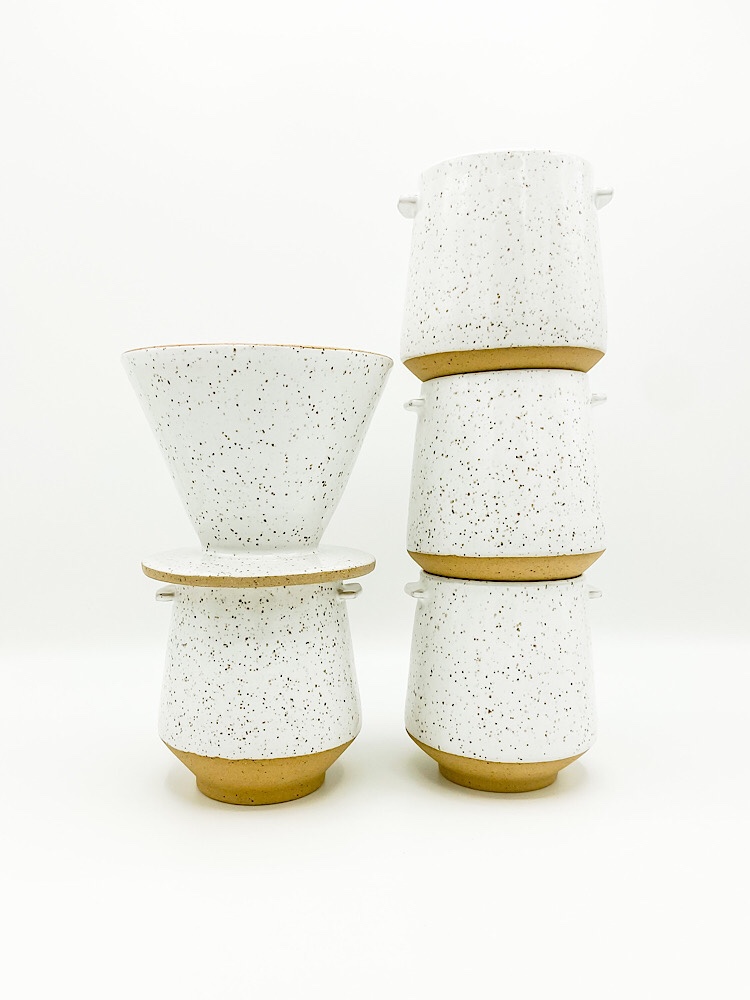
Name the biggest overall lesson you have learned in running a business?
I just realize that one can always do better and one can always improve. In the last two years, on paper it looks like I have turned this thing into a business, business is going well, I’m working with stores and I have constant work and I am “living the dream” and I should be happy. It’s stressful and it is hard to sometimes not be in your business, but work on your business. I realized, though, I love making things for a slow living, and I don’t have time to call my mom. It is not that I don’t have the time, I just feel like I don’t. It took my husband Uriel to say: “You’ve done so many things and you don’t think you’ve done anything. You are always like, this could be better, that could be better… you are never looking back and saying wow, that was awesome”. Every company could be better, even Google. At what point is one going to be satisfied? So, I would have to say that my biggest lesson is being able to recognize my achievements, no matter how small and being grateful for each opportunity that comes my way.
What is your no fail go to when you need inspiration? Or what do you do to get out of a creative rut?
I am a person who loves nature. I try to start my day in a place of calmness. I wake up before my husband, before anybody else is up. I sit on the porch and I watch my little creatures, my dog and my cat. I usually also go on a hike, try to get out there before anybody else is out and I get to hear the sounds of animals that aren’t out later because people are out. I get to watch the atmosphere change, and the fog lift and the sun rise and all of that. Nothing is more humbling than just being reminded that one is small and that life is a gift.
Name a woman or women past or present, whom you admire or look up to.
Oh wow, there are so many. I don’t really believe in favorites just because I think everything has its time and place. “Whom have I been talking about recently?”
This actually is not necessarily a woman I have ever thought about looking up to, just mostly because I don’t really know much about her, but there is something about this story that stuck with me. It is about Marilyn Monroe and Ella Fitzgerald’s friendship. Ella Fitzgerald is a very famous black jazz singer and Marilyn Monroe is a very famous white actress. Everyone knows Ella Fitzgerald now, she is incredible, but back then there were certain places where she couldn’t play because she was black. They would not hire her in a white club. Marilyn Monroe was such a huge fan of Ella Fitzgerald that she basically used her clout and power to talk to the different club owners. She would say: “If you bring her in, I will sit in the front row every night she plays and I will bring all of my people.” That to me is such an amazing story and there is a sense of justice to it. Ella deserved to be there on her own but sometimes opportunities like that aren’t afforded to people because of society, the color of her skin, whatever it may be. I think there are lots of obstacles that face everybody and seeing potential in somebody and then using your power and saying “No, I am going to try and make this happen for you.” Ella Fitzgerald would probably have been super famous anyway, but having that helping hand. It’s an inspiration: to Bring People Up!
Nombra la lección general más importante de la que has aprendido en la gestión de una empresa.
Me he llegado a dar cuenta de que siempre se puede mejorar y siempre se puede progresar. Mis últimos dos años, en papel pareciera que he convertido esto en un negocio, el negocio va bien, estoy trabajando con tiendas y tengo un trabajo constante y estoy “viviendo el sueño” y debería ser feliz. Es estresante y a veces es difícil no estar tan metida en el negocio, y solo trabajar en el negocio. Sin embargo, me di cuenta de que me encanta hacer cosas para vivir SLOW y aún así no tengo tiempo para llamar a mi madre. No es que no tenga tiempo, simplemente siento que no lo tengo. A mi esposo Uriel le tomó decir: “Has hecho tantas cosas y no crees que has hecho nada. Siempre dices, esto podría ser mejor, eso podría ser mejor… nunca miras atrás y dices wow, que increíble que hice esto.” Todas las empresas podrían ser mejores, incluso Google. ¿En qué momento uno va a estar satisfecho? Debo decir que mi mayor lección es poder reconocer mis logros, por pequeños que sean, y estar agradecido por cada oportunidad que se me aparezca.
¿Qué es lo que haces cuando necesitas inspiración? ¿O qué haces para salir de un estancamiento creativo?
Soy una persona que ama la naturaleza. Intento empezar el día en un lugar tranquilo. Me despierto antes que mi marido, antes que nadie más. Me siento en el porche y miro a mis pequeñas criaturitas, mi perro y mi gato. Por lo general, también hago una caminata, trato de salir antes de que nadie más salga y escucho los sonidos de esos animales que no salen en la tarde porque la gente ya está fuera. Puedo ver cómo cambia la atmósfera, cómo se levanta la niebla, sale el sol y todo eso. No hay nada más humillante que recordar que uno es un granito de arena y que la vida es un regalo.
Nombra a una mujer del pasado o del presente, a quien admires o admires.
Oh, vaya, hay tantas. Realmente no creo en los favoritos solo porque creo que todo tiene su momento y lugar. “¿De quién he estado hablando recientemente?”
En realidad, esta no es necesariamente una mujer a la que alguna vez pensé admirar, solo porque realmente no sé mucho sobre ella, pero hay algo en esta historia que se me quedó grabado. Se trata de la amistad de Marilyn Monroe y Ella Fitzgerald. Ella Fitzgerald es una cantante de jazz negra muy famosa y Marilyn Monroe es una actriz blanca muy famosa. Todo el mundo conoce a Ella Fitzgerald ahora, es increíble, pero en ese entonces había ciertos lugares donde no podía tocar porque era negra. No la contrataban en un club anglo. Marilyn Monroe era una gran fan de Ella Fitzgerald que básicamente usó su influencia y poder para hablar con los diferentes dueños de los establecimientos donde tocaban. Ella decía: “Si la contratas, me sentaré en la primera fila cada noche que toque y traeré a todos mis fans”. Para mí, es una historia increíble y tiene un sentido de justicia. Ella merecía estar allí sola, pero a veces las personas no tienen oportunidades como esta debido a la sociedad, el color de su piel o cualquier otra circunstancia. Creo que enfrentamos muchos obstáculos y ver el potencial en alguien y luego usar nuestro poder y decir “No, voy a intentar que esto suceda”. Ella Fitzgerald probablemente habría sido súper famosa de todos modos, pero logró mucho más con esa mano amiga. Es una inspiración: ¡Para educar a la gente!
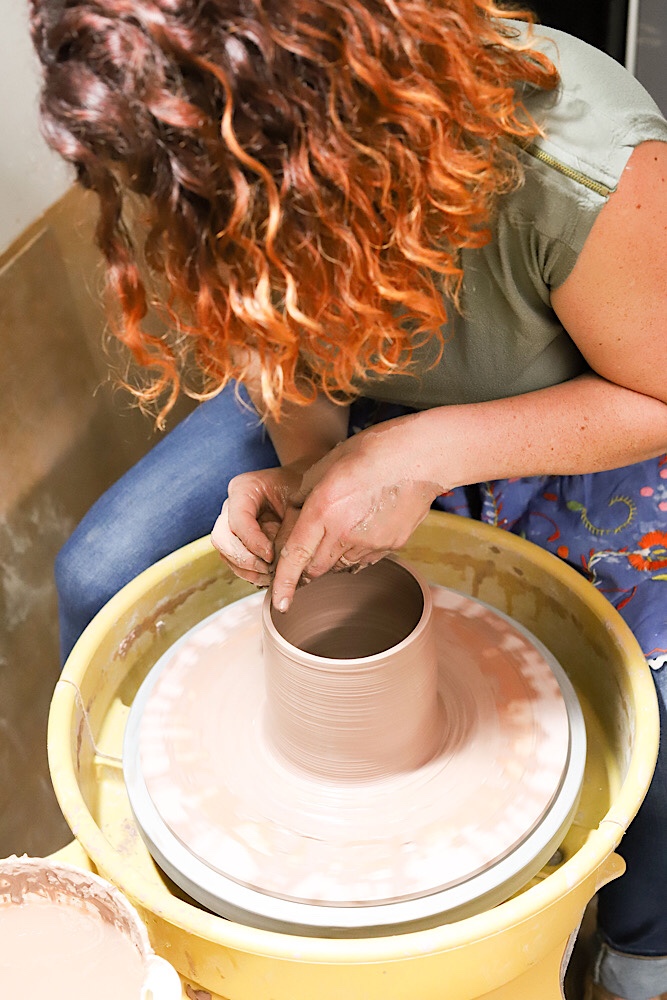
For more information about Sara Beckton-León, the following links are offered:
Para más información sobre Sara Beckton-León, se ofrecen los siguientes enlaces:
Photos by Jen Luce.
Interview by Iriany Sánchez
With your help, we can come out stronger than ever in 2021! Will you make a monthly contribution of $5 to Bell Arts Factory and keep Ventura filled with art, dance, music, and culture?
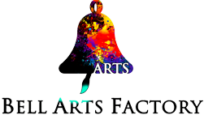
Hey very іnteresting blog!
Thank you very much!